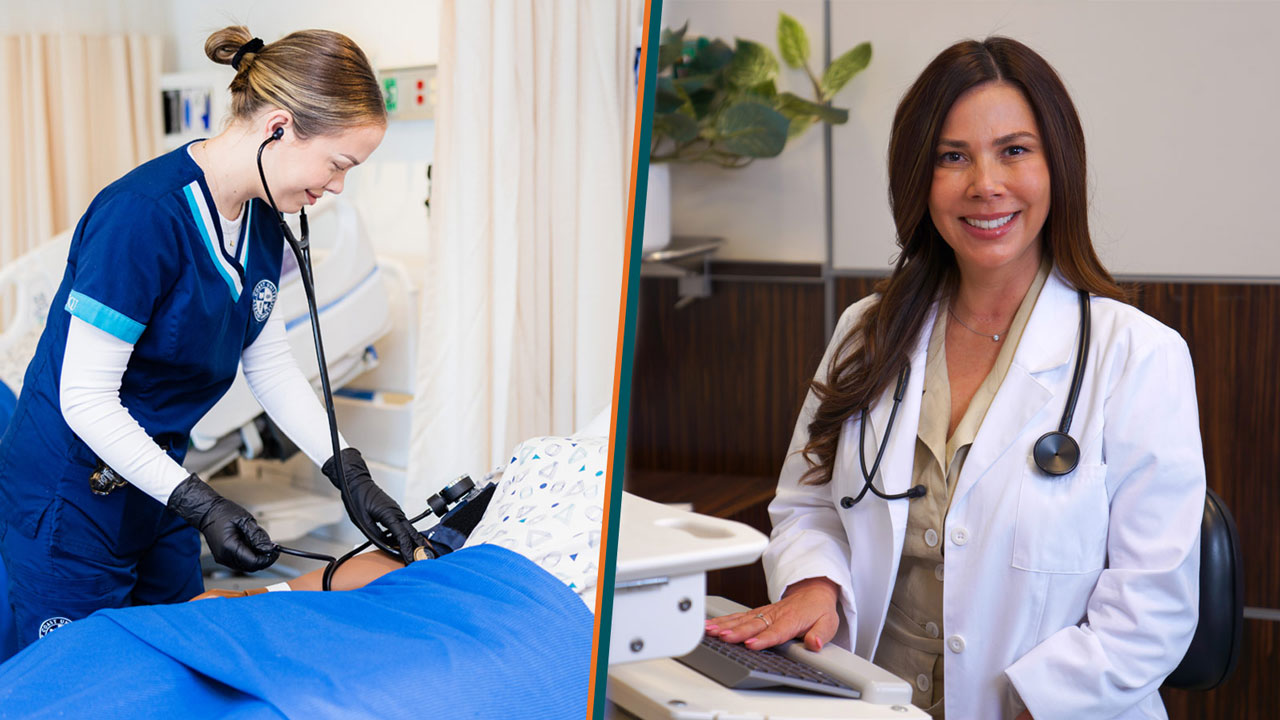There are many reasons registered nurses (RNs) make the transition to physician assistant (PA) roles. Whether you’re looking for greater autonomy in your clinical responsibilities, more traditional work hours, or higher levels of compensation, the switch could be helpful for achieving new career goals.
Transitioning from an RN to a PA can be a natural transition considering that both roles focus on direct patient care and can be carried out across a diverse range of healthcare settings. Both types of professionals play an essential role in helping patients maintain optimal health and wellness — but the key difference is the scope of their practice, with PAs having a higher level of authority and autonomy when it comes to diagnosis and treatment.
Before we dive into how an RN can become a PA, it’s important to understand the differences between the two roles.
RN vs. PA Roles: What’s the Difference?
RN roles are focused on direct patient care, handling duties such as taking and monitoring vitals, assessing and documenting patients’ conditions, and administering medications and treatments.
Meanwhile, PAs also perform direct patient care, but they have duties that are closer to those that a doctor can perform. Under the supervision of a physician, PAs can perform tasks such as ordering diagnostics tests, diagnosing illnesses and injuries, and prescribing medications and treatments. The amount of physician supervision that is required for a PA varies by state.
For a deeper dive into common RN and PA duties, here’s a side-by-side comparison based on information from the U.S. Bureau of Labor Statistics.
Registered nurse duties may include:
- Evaluating and monitoring patients’ conditions
- Documenting symptoms and medical histories
- Administering medications and treatments
- Establishing patient care plans or adding information to existing plans
- Coordinating with the patient’s healthcare team, including doctors and other healthcare professionals
- Using and monitoring medical equipment
- Assisting with diagnostic tests and analyzing results
- Educating patients and their families about how to manage illness or injuries following treatment
Some registered nurses may also oversee licensed vocational nurses (also known as licensed practical nurses), nursing assistants, and/or home health aides.
Physician assistant duties may include:
- Reviewing patients’ medical histories
- Performing patient examinations
- Ordering and interpreting diagnostic tests, such as blood tests or x-rays
- Diagnosing injuries or illnesses
- Prescribing medications
- Treating patients, such as administering immunizations, setting broken bones, or applying stitches
- Educating and advising patients and their loved ones on various healthcare issues and needs
- Evaluating and documenting the patient’s progress
- Staying up-to-date on the latest treatments to help connect patients with quality patient care
- For both RNs and PAs, their exact duties will depend on the specific healthcare setting and specialty area in which they work. A few examples of specialty areas may include family or internal medicine, pediatrics, emergency care, surgical care, oncology, and mental healthcare.
- Additionally, in rural and underserved communities, it’s common for PAs to act as primary care providers, such as in clinics where the supervising physician is only in the clinic a couple days a week.
For both RNs and PAs, their exact duties will depend on the specific healthcare setting and specialty area in which they work. A few examples of specialty areas may include family or internal medicine, pediatrics, emergency care, surgical care, oncology, and mental healthcare.
Additionally, in rural and underserved communities, it’s common for PAs to act as primary care providers, such as in clinics where the supervising physician is only in the clinic a couple days a week.
RN and PA Educational Requirements
Another big point of differentiation between an RN and a PA is the level of education that’s required for each role.
Degree requirements for registered nurses
Registered nurses typically need to complete either a Bachelor of Science in Nursing (BSN) or an Associate Degree in Nursing (ADN) and then pass the National Council Licensure Examination for registered nurses (NCLEX-RN) in order to become licensed in their state.
A standard associate degree program takes two years while a standard bachelor’s degree program takes four years, though time to completion for a BSN or ADN can be shorter or longer depending on the program pace. For instance, WCU’s BSN program is accelerated and can be completed in a little over 3 years. Keep in mind that you could shorten the time to completion for your bachelor’s degree if you already have an ADN or if you have enough working experience as a licensed or registered nurse.
Another big point of differentiation between an RN and a PA is the level of education that’s required for each role.
Degree requirements for registered nurses
Registered nurses typically need to complete either a Bachelor of Science in Nursing (BSN) or an Associate Degree in Nursing (ADN) and then pass the National Council Licensure Examination for registered nurses (NCLEX-RN) in order to become licensed in their state.
Considering prerequisites and clinical experience requirements
Many physician assistant master’s programs require applicants to have bachelor’s degrees in science-based fields such as biology or health sciences, or to meet certain criteria regarding coursework in the sciences. Healthcare experience may also be a requirement or a point of differentiation for program applicants
To give an example, West Coast University’s Master of Physician Assistant (MPA) programs require applicants to have completed certain prerequisite courses in the sciences and to meet a certain threshold for their cumulative biology/chemistry/physics (BCP) grade point average (3.0 or better for the California program and 2.7 or better for the Texas program).
Additionally, applicants to WCU’s California MPA program must provide documentation showing that they completed 500 hours of observation, volunteer and/or work in a clinical setting. While the WCU’s Texas MPA program does have this requirement, showing such experience is recommended in order to give the applicant a competitive advantage. Learn more about the admission requirements for the California MPA program and Texas MPA program at West Coast University.
Transitioning from an RN to a PA
While it is not common to see educational programs that focus on transitioning registered nurses into physical assistants, RNs who follow the next steps for education, training, and licensure can achieve their goal of becoming a PA.
If you’re a nurse with BSN, you already have a strong educational foundation in the sciences as well as professional healthcare experience that can help you stand out as a PA program candidate. You may just need to fill some gaps to ensure you meet all the requirements to apply for your desired program. And if you don’t already have a BSN, earning your bachelor’s degree can be your first step to pursuing your new career path.
Here are some steps you may need to complete if you’re a nurse who wants to apply for a PA master’s program:
- Research physician assistant master’s programs and decide which ones you want to apply to. This can help ensure you’re working toward meeting the correct criteria and prerequisites, as eligibility and admission requirements vary by program.
- Earn a bachelor’s degree in the sciences, which can include a Bachelor of Science in Nursing. A BSN can be especially ideal if you want to work as an RN for a few years to build up your experience and then study to become a physician assistant in the future. If you already have an ADN, you may have a head start.
- Complete the necessary prerequisites and maintain a high GPA in your science-based coursework. This can help ensure you meet the admission requirements for your desired program and help you stand out from other candidates. If you already completed your bachelor’s degree, you may need to take more coursework to fill any educational gaps.
- Leverage your clinical experience. As an RN, you will have the advantage of extensive direct patient experience, which can help you stand out as a PA program applicant.
Once you complete a PA program, you will need to pass the Physician Assistant National Certifying Examination (PANCE) and apply for licensure in your state. Note that licensure requirements vary by state, so make sure to thoroughly research the process ahead of time.
Check out our career guide on how to become a physician assistant in California for more specifics.
Get Started on Your BSN or MPA Program
If you’re eager to get started on your education, it’s time to explore programs that can help you achieve your goals. West Coast University offers bachelor’s and master’s programs that are designed to provide you with the comprehension curriculum and hands-on experience you need to prepare for a career as a registered nurse or physician assistant.
Below are a few things you need to know about WCU’s programs.
Bachelor of Science in Nursing
- Format:
- On-campus
- Locations:
- Richardson, TX (Dallas area)
- Miami, FL
- Los Angeles, CA
- Ontario, CA
- Orange County, CA
- Duration:
- 39 months at the accelerated pace (all campuses)
- 44 months at the evening and weekend pace (Miami campus only)
- 54 months at the working professional pace (Miami campus only)
WCU also offers an LPN to BSN program, LVN to BSN program, and an RN to BSN program for those who are interested in using their nursing experience toward their bachelor’s degree.
- Locations:
- Richardson, TX (Dallas area)
- Los Angeles, CA
- Format:
- Hybrid in California (combining online and in-person learning)
- On-campus in Texas
- Duration: 24 months
With on-campus simulation labs, clinical rotations, and help preparing for the NCLEX and PANCE, you have access to the support you need to thrive in your educational journey. Schedule an info session today to learn more about WCU.
WCU provides career guidance and assistance but cannot guarantee employment. The views and opinions expressed are those of the individuals and do not necessarily reflect the beliefs or position of the school or of any instructor or student.



